In life, whatever we do, our mind plays a significant role, right? It helps us to sleep; it helps us to work, eat, or even to get angry with others or ourselves.
For us or any other living being on this planet, to carry out any task, mind has the topmost priority to be the part of the process to accumulate something.
But if the mind is the guiding north star of our lives, then why do we get impatient while standing in a queue at a mall when the mind was the one who in the first place helped us to get there.
It seems like something really messed up with our minds. Like it has no control over anything.
Well, to be patient, you don’t need any control over your mind.
What you need is the reason. Reasons to understand our mind and then act consciously according to the situation.
Therefore, in this post, we are going to share reasons why people feel impatient, which of course, helps you understand your less patient behaviour, or it would give you better ideas about the causes of impatience.
Why Do We Feel Impatient? The 10 Must-Know Causes of Impatience
- The First Wheel – The first invention of human history to reach somewhere faster developed a habit of doing things faster.
- Our Habit – We get impatient when something doesn’t go according to our habit.
- Time, when things are important – We get impatient when time and priority involve in a task.
- Success of another person – We get impatient when another person is doing better than us.
- Burden – When we want to complete all of those tasks in less time.
- Attitude & winning Factor – When we don’t want to listen to another person.
- Low resisting power – Impatience causes when we try to avoid things we do regularly.
- No results – When we don’t see results in our work or something, we’re putting time in.
- Short length content – We feel impatience due to our low attention span.
- Reality – We feel impatience when we don’t accept reality because it hurts our feeling or beliefs.
And as it’s a shared human experience, therefore, you may find these below impatience reasons one of yours for not having patience in a relationship, at work, on a date, and in any other life situation.
1. The First Wheel: Entry of Impatience in Our Lives
The birth of impatience happened when humans first invented the wheel.
Our thirst to reach somewhere faster led us to invent furthermore transportation mediums that disturbed the cycle or environment of patience, such as ships, planes, trains, and more.
Our first invention engrained the thought that we can do a lot of better things than hunting. So, we kept doing inventions in other areas of life as well.
And our need to reach somewhere faster developed a new habit in us to do things faster.
With our every new invention, we kept denting the structure of patience in us.
However, until the 1960s, patience still had the power upon people. But then, we did the most significant invention of all the time, the Internet. And it shook the foundation of patience. We stepped into the digital world, and everything changed for patience.
We did inventions from factory helping tools to AI-based solutions for our real problems. Now, all we see is faster — no place for patience.
If you want a cab, just open an app on the mobile phone, and your taxi would be outside in a minute.
Don’t send postcards to your relatives and wait months for their replies, a simple call or email would do that for you.
Order food, and it will arrive in 15 minutes, or you’ll get your money back guaranteed.
No need to stand in a queue at a mall ’cause Amazon.com got your back.
Haven’t paid your bills and can’t stand outside the billing counter, because you’ve to pee and don’t want to give your spot to another person, then don’t worry, there’s an online portal for that, too.
Ah! It seems like there’s no need to be patient.
All these inventions, fast solutions to our problems, and our interaction with technology made us a living version of the computers that want the output of an input right way.
Though computers deliver output instantly unless they have no manufacturing defects.
We are human to say but want to behave like a computer/machine. And that’s never going to happen in the distant future. Even if technology would do this, we cannot say anything for sure.
2. Our Habit: The Reason for Most People Why They Feel Impatience
If you often ask yourself, “why am I so impatient,” then your habit may be one of the reasons.
We feel impatient when something doesn’t go according to our habits.
And this might lead us to feel more severe human emotions, like anger, disgust and annoyance.
However, this impatience caused by our habit only comes when we’re taking/expecting something from other than ourselves.
For instance, if you have the habit of having lunch at 01:30 PM every day, and somehow on occasion, you don’t get it at the right time, then you start to feel impatient.
3. Time: When Things Are Important
In our lives, time (or the amount of time) plays a significant role in whether we feel impatient or not.
There are situations when having less amount of time can cause impatience in us. Likewise, having plenty of time can also lead us to feel impatient. It’s not necessary that having less time to accomplish our end goal is the only reason we lose our patience.
Because restlessness caused by the amount of time always involves the priority of the task.
To make this statement clear, assume that today at 10:00 AM, you have an essential exam at the university or an important meeting at the office.
You leave your house at 02:00 hours early to get the bus so that you won’t get late for the important event today.
Now, at the bus station, you, waiting for your transport, are excited and motivated to reach your destination. But then, the bus isn’t showing up. And now you start to get anxious that you’ll get late and miss the opportunity.
Even after the bus has arrived, and you being aboard on the bus gets sceptical and restless for every turn the bus takes or stops at a signal, that you’ll get late — ignoring the fact that you’ve got plenty of time to reach there.
However, on the other hand, if your priority is low, then whether you’ve got less/plenty of time, you won’t feel impatient.
For example, your day at the office starts at ten in the morning. And you’re still lying in bed till 09:30. If you hate your job or it’s boring, then the priority of getting up and being ready for the job would be less.
And you don’t feel any emotion of impatience.
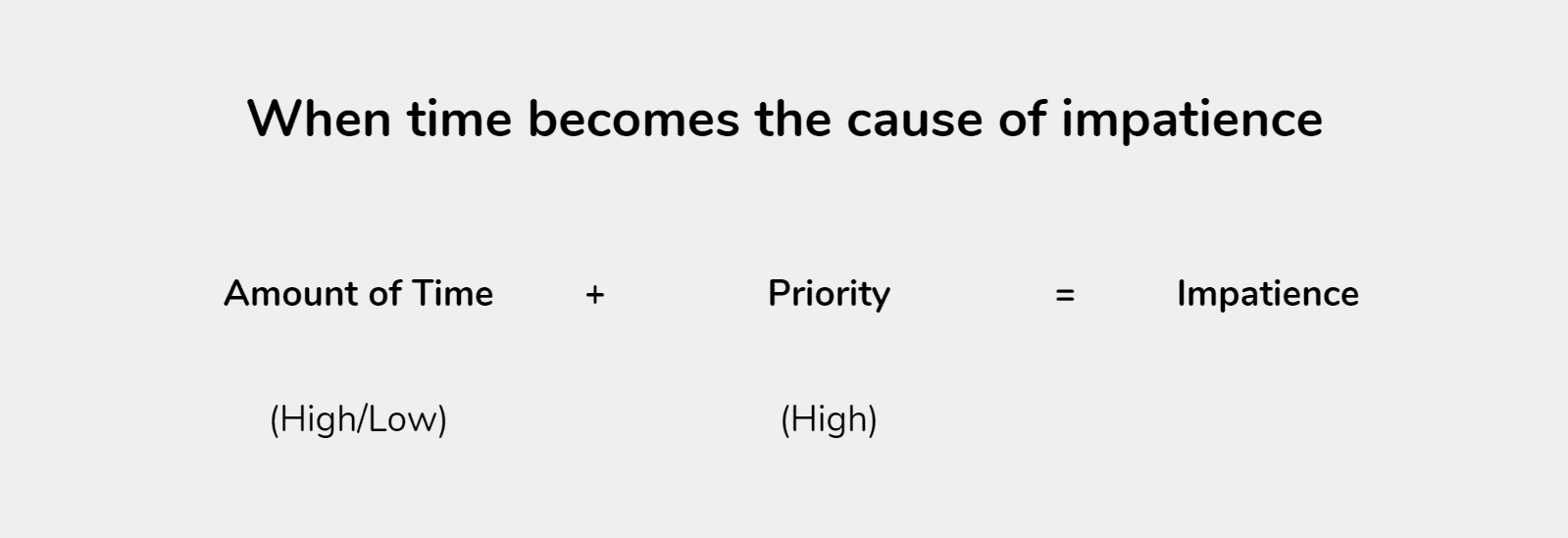
In case of impatience, when time & priority is involved, we always switch from lower priority to a higher.
And this happens inevitably without any thoughts or consciousness.
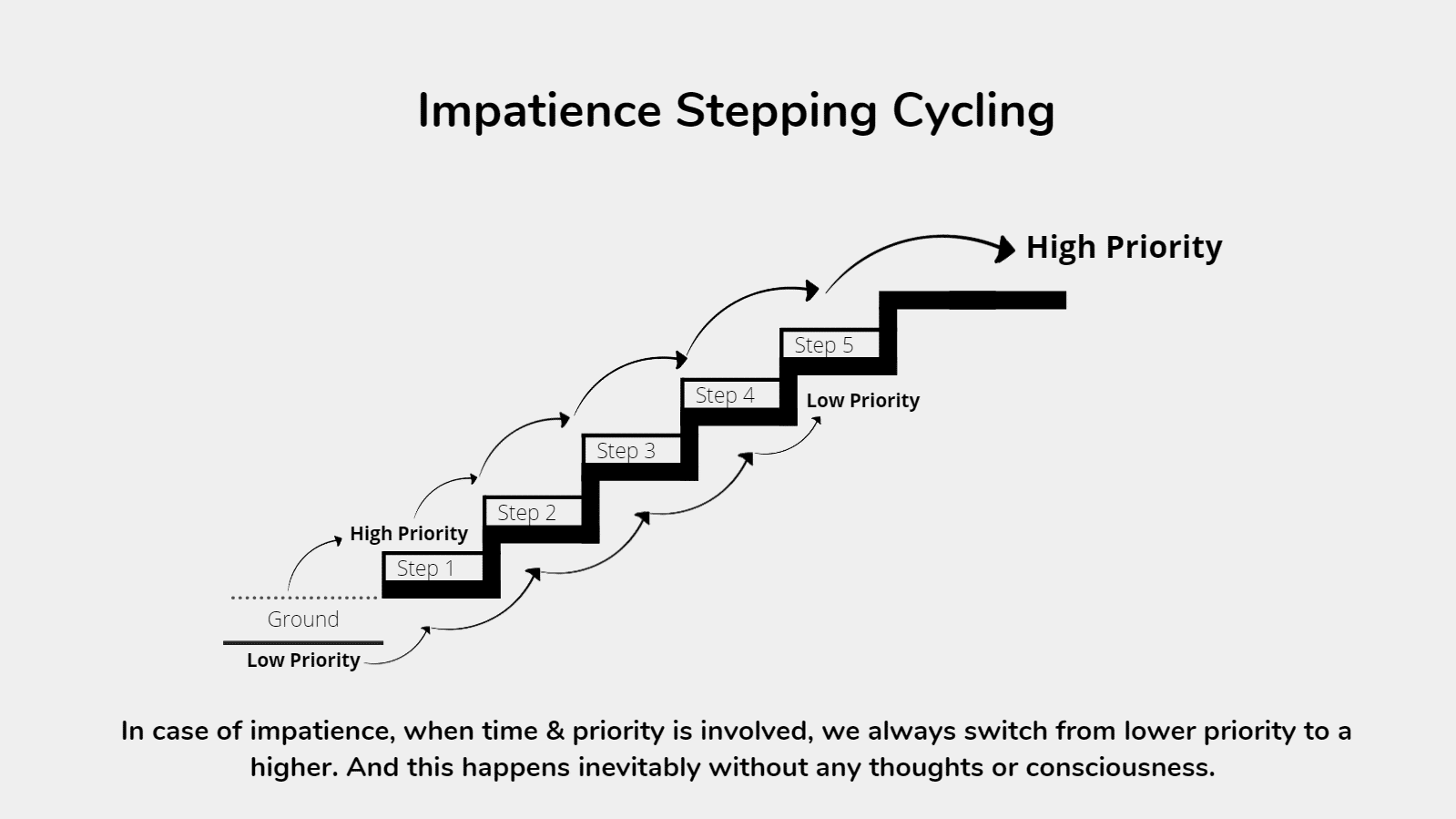
For example, you’re dedicatedly working on a task in the office. You’ve no knowledge what time it is and how much time this task would take to complete.
You’re too focused on doing it—no urge to go home and leave the job undone.
Then, suddenly your eyes catch the clock. It’s 15 minutes more left to complete your office hours.
And at home, your wife and family are waiting for you because you’ve promised them to take them out for dinner. Or your girlfriend is waiting outside the office.
Now, your all focus swiftly comes to leave the office.
You get impatient to complete the task & better off. And this phenomenon is called the “Impatience Stepping Cycle,” where the mind gets impatient for the high priority leaving less priority at bay or less concerned.
In the above example, you either choose to complete the task in a hurry because it affects your work progress if you leave it undone. Or leave it undone and leave the office for home.
4. When We See People Succeed or Getting Better Than Ourselves
This is the world-famous reason why we feel impatient.
It’s a shared human experience, and everybody feels it. And the only reason why it happens is when we compare ourselves to others.
We see and measure our and other people’s position.
Furthermore, the feeling of impatience caused by this reason, most of the time, leads us to either something better or worse.
It all depends on our thinking and how we are treating and interpreting another person’s success. Is it making a good impact on us or a bad one?
5. Burden: One of the Worst Causes of Impatience
The feeling of impatience arrives in us when multiple tasks need to be done.
Why?
Because by looking at the various tasks, we develop a target or goal, where completing all of these would provide us relief or freedom to do something else.
And this feeling of ours to get free from the burden motivates our mind to complete all of those tasks in less time as much as possible.
Thus, we adopt the do things faster, the nature of modern humans, and start to get impatient.
If the end goal is in our mind, and we’re eager to achieve that, then we’re sure to feel impatience.
You May Also Like
6. Our Attitude and Winning Factor
In most conversations, whether it’s happening at a workplace or in a relationship, our mind gets out of control because we don’t want to lose — our winning factor.
If someone has commented on us, we can’t simply ignore it; at present, our mind and its thoughts are influenced by the mind who likes to win.
Therefore, we throw back words without even thinking.
The same happens to the other person, and he/she does the same thing as we did.
Our winning factor is the arch-rival of our patience, and it has been ingrained in us since childhood — a hard thing to deal with.
No matter what the situation is, we always like to win.
You can experience it right now, reading this article. You want to read this complete because you want to win at reading.
Nevertheless, it’s good in some situations — as in reading this blog post and succeeding at it would help you understand your impatience and develop more patience.
But, the winning factor of ours is pretty nasty when our Attitude gets mixed up with it.
With our attitude, we start to see people inferior and ourselves superior.
Like, we know more stuff than the other.
And once you start to feel like this, you always want to win because that’s what a superior person does.
With an attitude of superior + winning factor, there’s no going back for you. Unless you have a huge setback or mountain of pain come down upon you.
Perhaps, multiple setbacks to help you understand that we all are human beings and hold an equal place in this world.
Nobody is Up, and Nobody is Down.
7. Lack of Resisting Power
Another fine reason that causes impatience in ourselves is that we lack resisting power.
And it happens when we try to avoid things we do regularly.
For instance, you want to stop smoking. Now, what will happen, you’d try to avoid it in a day multiple times.
But if your resisting power is low, then it would only take you minutes or a couple of hours to get yourself back on the mouthful of smoke.
Hence, triggering impatience in your brain. And this applies to everything you’re trying to avoid.
Like, you want to stop eating junk food, watching pornographic films, drinking alcohol, etc. Not only the bad stuff, but it also includes the good one, too.
8. Lack of Results: Not Loving the Process
Now, you’d ask what in the hell results have something to do with our lack of patience problem.
Okay, now answer one thing. If you do something and it would not show any results, then would you believe it? Would you keep doing it regardless of results?
We can say for sure you’ll say, YES.
Did you say that? If yes, then it was because the question had a very straightforward answer.
It was showing you have to say yes.
Perhaps you are doing something that doesn’t show results, and you don’t want to tell yourself that you don’t believe it.
Anyways, if the answer was no, that is, no results and no belief. Then you’d have no patience.
Why?
Because belief is the thing that keeps patience in ourselves.
Belief is the thing that tells us to keep walking and don’t quit. And even though we do feel impatient doing that thing, we believe because of the belief, no matter how many times it doesn’t show any results.
No Results = No Belief = No Patience.
9. Viewing and Interacting With Short Length Content
This one is a pretty famous reason in today’s digital world after the discovery of the internet.
Things were pretty impressive when YouTube first came out.
Slow internet speed, long content with buffering, and pretty much less, but good content producer.
It was fun until social networks didn’t become available on mobile. But then, everything changed.
Less expensive smartphones, cheap data plans, faster speed, and lots of lots of garbage content. Every 3 guys in 5 people is a Vlogger.
And of course, the Infinite Scroll.
What is happening is that we are consuming things that only have 2 to 3 minutes of content. And on Instagram, it only takes 2 to 3s.
The Infinite Scroll, causing us to scroll the page in every 1s.
We are becoming less focused and addicted to much of much content every minute. This whole short content viewership is taking away our focus and cutting time in our attention span.
Meaning, we are getting impatient to see new things every time.
When it doesn’t come, we swipe up. Whether we are watching something or eating, we get impatient if we don’t get the dose of new or exciting.
And to numb this problem, we pick our mobile phones. It’s like drugs, and yes, in today’s world, social networking is a drug.
TikTok has done it very well. Think for a second or try; once you go to Instagram or TikTok, you don’t have any clue how much time you have spent on it.
How much power you have given to the impatience. It will take hours for you to realize that, man, you’re swiping the screen the whole day.
You may find more about it in the documentary The Social Dilemma. Where former employees of these big social networks are talking about the toxicity, we’re facing each day.
10. Not Accepting the Reality
Everything comes down to a single point. We don’t accept reality, and then further, it makes us feel impatience.
You’re getting late, and you can’t accept it, you feel impatience.
There’s so much traffic, vehicles honking, radio’s playing the song you hate, and there’s no chance for you to escape. You can’t accept it. Thus, you get impatient.
Non-accepting reality gives rise to less patience in our mind and everything around us.
These above are some of the reasons we – Nathawat Brothers – have encountered. Surely there could be more, and if you know them, then please share your views in the comment section below.
And if you want to learn how you can deal with your impatience, then you might want to read our another post, How to be patient in the face of impatience?
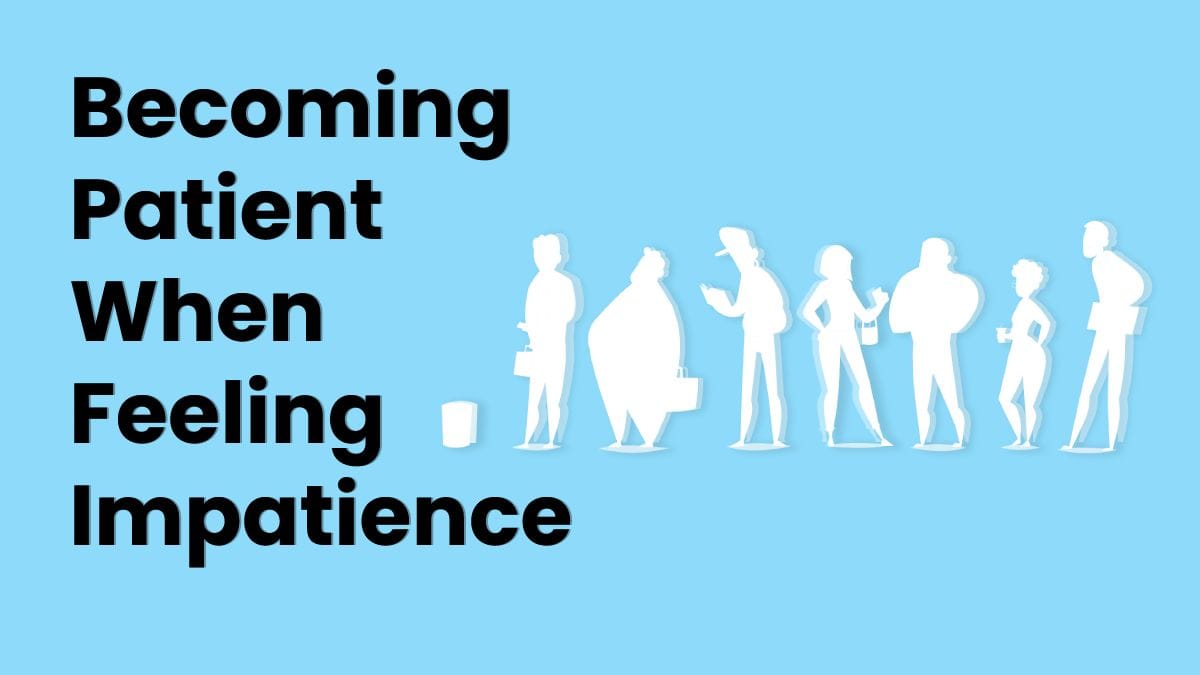
Moreover, please don’t forget to share this post with your friends and family.
Subscribe to our newsletter to stay updated with mindful and helpful posts like this one.

And if possible, please visit our show courtesy page, to help us help other people. Or you can use the above button to Buy Us Coffee.
Thank you.
Nathawat Brothers
Putting thoughts for everyone
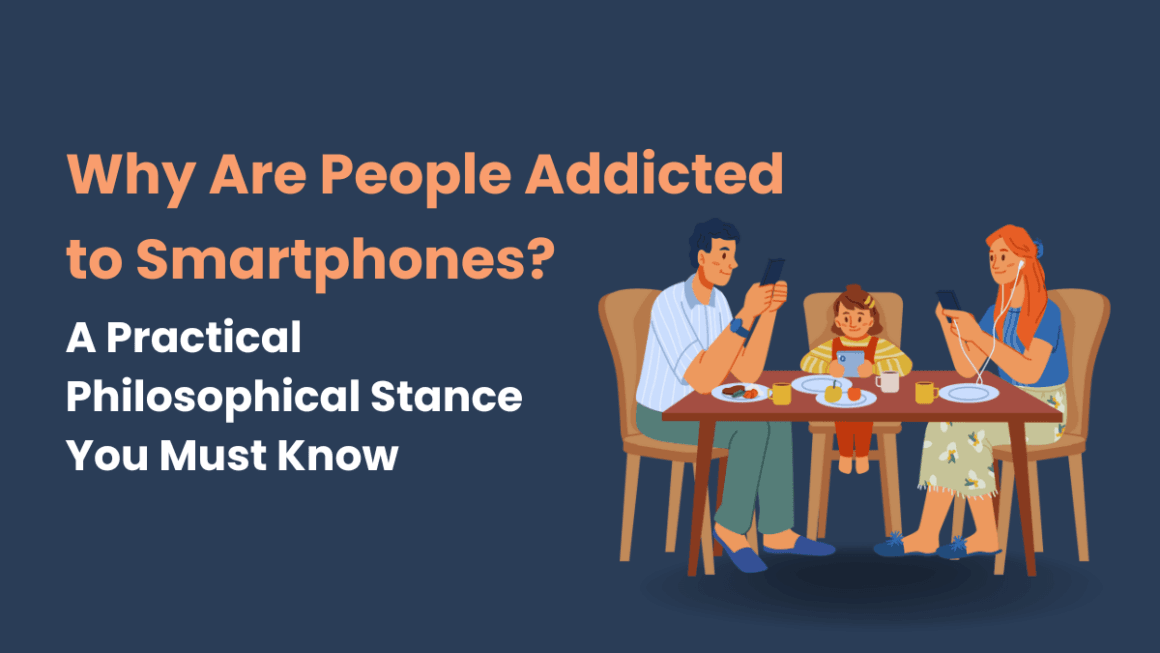
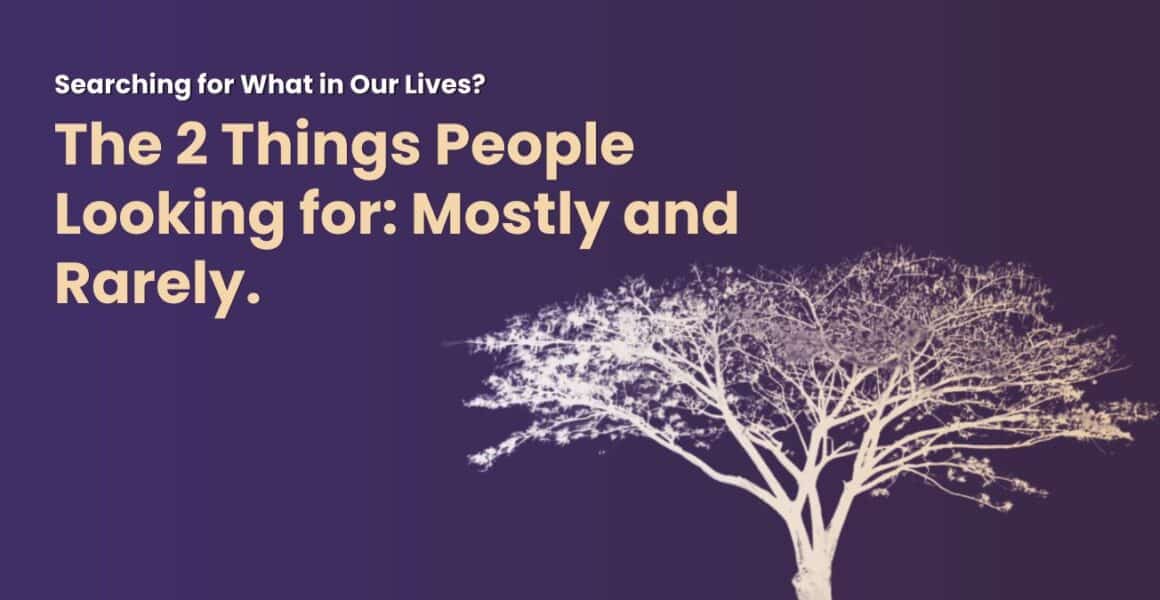




Thanks. This helped a lot
These are amazing facts. Thanks
Yes, nice article
If we’re here? is because we know the subject, but! especially now! the span of attention is meager; and to go about with so much intricacy is bound to defeat the purpose. Too long, too much
It was great. Thanks a lot